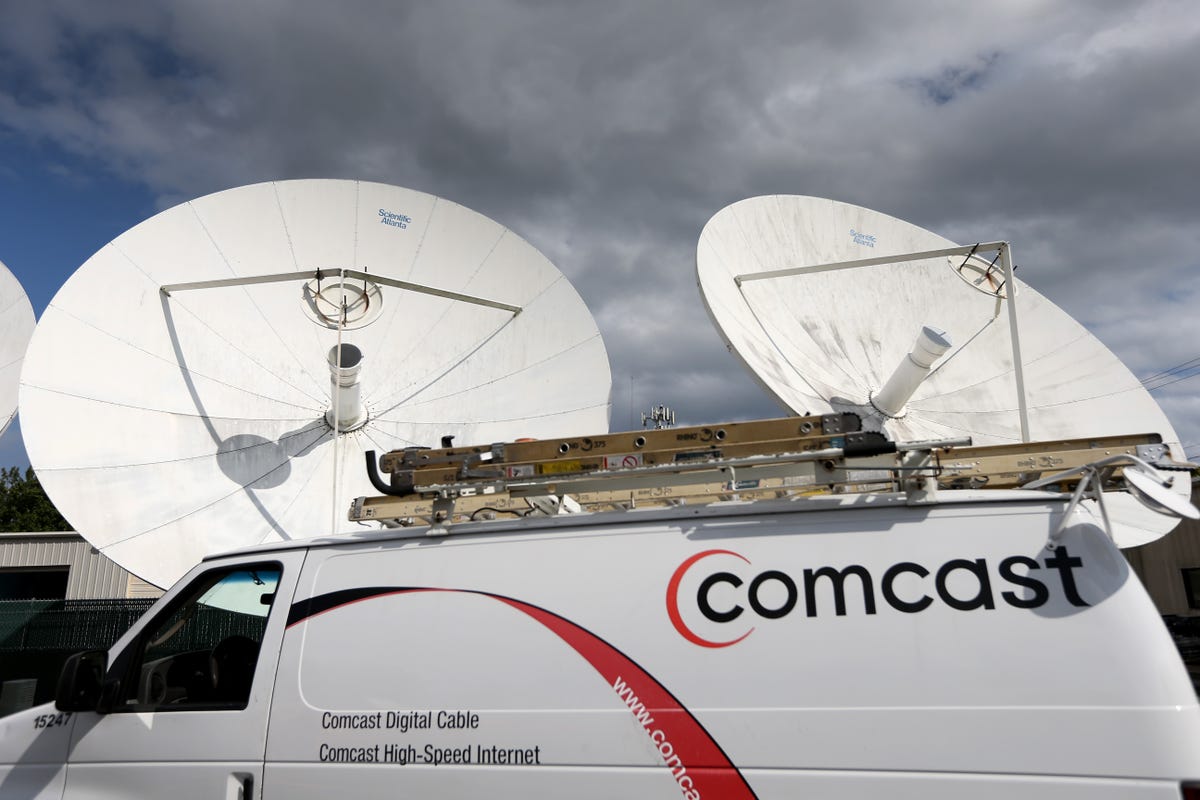
Getty Images
Comcast said Friday that it has terminated its $45.2 billion merger plans for Time Warner Cable, with the marriage of the top two cable operations in the US likely quashed by opposition from regulators.
Still, it appears another suitor — Charter Communications — may bid for TWC.
“Today, we move on,” Comcast CEO Brian Roberts said in a short statement. “Of course, we would have liked to bring our great products to new cities, but we structured this deal so that if the government didn’t agree, we could walk away.”
News that the deal was falling apart started to emerge Thursday afternoon, with reports saying that increasing concerns from US regulators would end the tie-up. Earlier in the week, Comcast officials met with the Justice Department and the Federal Communications Commission to discuss potential concessions in the deal.
Shares of TWC, the second-biggest US cable operator and based in New York City, were up about 5 percent, amid a report from The Wall Street Journal that Charter is planning for a potential TWC bid. Comcast, the largest US cable company and based in Philadelphia, saw its stock trade mostly flat.
Charter, which has bid for TWC before, is the fourth-largest cable operator. A Charter spokesman didn’t immediately respond to a request for comment.
A merger between the Comcast and TWC would have created a pay-television giant with about 30 million subscribers and control of over 50 percent of the broadband-Internet market. That much power in the hands of one company, critics argued, could have pushed costs for consumers higher, influenced the distribution of video content and hindered competition from Internet companies like Netflix that stream video over broadband networks.
Ending the Comcast-TWC proposed deal “is in the best interests of consumers,” FCC Chairman Tom Wheeler said in a statement Friday. “The proposed merger would have posed an unacceptable risk to competition and innovation, including to the ability of online video providers to reach and serve consumers.”
The Justice Department and the FCC work closely in reviewing mergers in the communications sector. The Justice Department looks at whether mergers violate antitrust laws or raise related concerns, while the FCC considers whether mergers would be in the public interest.
Rumors have circulated in the last few weeks that the Justice Department staff had concerns about the deal and were considering suing Comcast to stop the merger. And on Wednesday, FCC staff expressed their own concerns about the deal and suggested commissioners consider sending it for a review by an administrative law judge, a source familiar with the situation confirmed.
Time Warner Cable CEO Robert Marcus focused his comments Friday on the strength of his company. “Through our strong operational execution and smart capital allocation, we are confident we will continue to create significant value for shareholders,” he said.
RELATED LINKS
- Comcast to ditch $45.2B takeover of Time Warner Cable, report says
- Comcast statement on deal ending
- Time Warner Cable statement on deal ending
- Comcast, Time Warner Cable to unite in $45.2B merger (Feb 2014)
Sen. Al Franken (D-Minn.) said last night that a collapse of the deal “would be a huge victory for American consumers.”
Franken, who has opposed the deal since it was first announced in February 2014, had pressed regulators to reject it. He took a lead role in questioning the merger at a Senate Judiciary Committee hearing. And earlier this week he wrote a letter to the FCC and the Justice Department, signed by five other senators, outlining his concerns.
“I’ve been opposed to this deal since it was first announced, and I’m glad that over the last 15 months, more and more people have come to see it the way I do,” he said in a statement. “This transaction would create a telecom behemoth that would lead to higher prices, fewer choices, and even worse service. We need more competition in this space, not less.”
When the deal was first unveiled, many in Washington, D.C., expected it to be scrutinized by regulators but they believed it would ultimately be approved with a long list of conditions, much like Comcast’s 2011 deal for the majority of NBCUniversal (It took full control of NBCUniversal from General Electric in 2013).
Comcast argued that since its service area and customer base for broadband and video didn’t overlap with Time Warner Cable’s, there was no threat to competition. It argued as well that with its new scale it would be able to bring more innovation to Time Warner Cable customers, especially in markets such as New York City and Los Angeles.
The collapse of the Comcast/Time Warner Cable tie-up will have a ripple effort on other side deals. Charter Communications, a regional cable operator based in St. Louis, was lined up to acquire Time Warner Cable subscribers that Comcast would likely divest as part of the acquisition. Also, as part of this arrangement, Charter was going to buy Bright House Networks, another smaller cable operator. Now that the deal has collapsed, both of those side deals are off the table.
But this doesn’t mean Charter won’t make another big acquisition effort. Before Comcast and Time Warner Cable announced their deal last year, Charter had aggressively pursued Time Warner Cable. It’s likely the company will try again.
John Malone chairman of Liberty Media, which owns a large stake in Charter, said at Liberty Media’s investor conference in November that he would try to acquire Time Warner Cable if the deal with Comcast fell through, according to reports.
Comcast, though, is unlikely to pursue another acquisition after being burned by the TWC deal, and may instead make a big purchase of its own stock to placate shareholders, Wells Fargo analyst Marci Ryvicker said in a note Friday. “In our view,” she said, “there is a zero percent chance that Comcast goes in front of the regulators.”
Updated, 11:25 a.m. PT: Added information on possible Charter bid for TWC.




